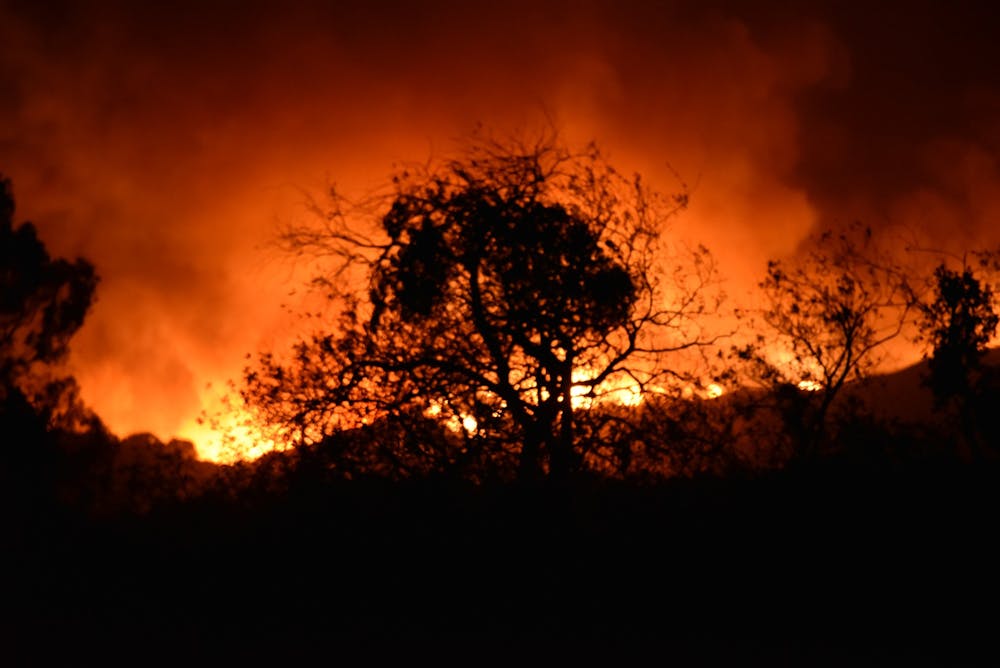The recent California wildfire shook the nation as flames redden the sky; record-breaking tropical storms have damaged countless properties and impacted the lives of thousands; temperatures have steadily risen. There is no doubt climate change is wreaking increasing amounts of havoc on the world every day despite denial and conspiracy theories.
Environmental disasters are escalating and seem to be occurring with unprecedented frequency. It’s easy to blame the Trump administration — which has pushed to rollback environmental protections and pulled the U.S. from the Paris Agreement on climate change. Still they are not the sole culprits of our current climate crisis, and it would be unproductive to treat them as such.
Moreover, many environmentalists (myself included) tend to fall into a blaming mindset that some corporations and big names screw over the environment and the working class in an obsessive pursuit of materialism. While corporations are not off the hook, I think it is also important to take an introspective look at how I’m part of the system that harms the environment.
No one country can be blamed for climate change; the devastation extends across cultural, ethnic and national boundaries. China is infamous for the particulate matter 2.5 air pollution in its densely populated cities, but surface water and groundwater pollution also pose dire challenges for the residents’ health. Intense heat waves pushed Australia’s Bureau of Meteorology to create a new color to represent the unprecedented temperatures. Hurricanes and storms, when landed, wreck coastal cities across national boundaries.
However the effects of climate change are not equally felt. During an internship in Australia, I learned about the drastically different roles urban heating island effects have in Eastern Sydney, which is home to prosperous financial districts, and Western Sydney, a less wealthy area. Although similar in geography and part of the same local government, suburbs are not sharing the heat load equally: Some swelter with surface heat temperatures up to 20 degrees Celsius higher than the neighborhood next door. The worst-affected areas all too often are poor, outer suburbs with lower capacity to invest in innovative solutions to cool down urban areas, such as renewable energy and green roofs.
A similar pattern of inequality, in sharing environmental burdens and in general, is a result not of U.S. President Donald J. Trump, but societal development. Many blame the Trump administration for current social unrest across America, especially because of his refusal to condemn white supremacists and encouragement of the use of violence by law enforcement. While Trump has undoubtedly contributed to racial tensions, inequality and disparities existed long before 2016.
Similarly, while Trump has endorsed and shared conspiracy theories that climate change is a foreign hoax, environmental degradation began with the Industrial Revolution, when humankind learned how to exploit natural resources for convenience and profit. Capitalist motives pushed companies to build factories overseas in order to bypass environmental legislation in their home countries.
The battle against climate change is not against Trump or any specific individual; rather, it is a struggle to defy the norms of modern life in which every one of us chooses convenience and profitable industries over sustainability.
No one is innocent regarding global warming on the individual, organizational or governmental level. Our fast-paced, globalized lifestyle has prioritized efficiency over conservation. Air travel greatly increased the volume and intensity of carbon emissions; food waste and fast fashion have become commonplace for a developed society. We tacitly agree with these environmental damages by purchasing these products or merely being an agent in the economy that supports such industries.
I hope that this November the American people choose to get rid of the devastating influence of this administration. Yet we must keep in mind that neither climate change nor inequality will cease to exist when Trump leaves office. The fight for the environment didn’t stop when Trump was elected, and our work will only increase as time goes and damage to the planet continues. In the battle against climate change, we need to fight on the same side, not against each other.
Shizheng “JJ” Tie is a senior studying Environmental Engineering from Luoyang, China. She is a Senior Class Senator in the Student Government Association.





